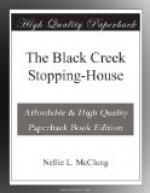When the old man was safely out of the way Fred put his revolver back where he had found it. The irony of the situation came home to him—he had gone out to kill, but in a mysterious way it had been given to him to save instead of take life. But what good was anything to him now?— the old man had come one day too late.
At daylight, contrary to all expectations, the storm went down, only the high packed drifts giving evidence of the fury of the night before.
As soon as the morning came Fred put on his father-in-law’s coat, having left his in the snow, and went over to the Black Creek Stopping-House. Mrs. Corbett was the only person who could advise him.
He walked into the kitchen, which was never locked, just as Mrs. Corbett, carrying her boots in her hand as if she were afraid of disturbing someone, came softly down the stairs.
Mrs. Corbett had determined to tell Fred what a short-sighted, jealous-minded man he was when she saw him, but one look at his haggard face— for the events of the previous night were telling on him now—made her forget that she had any feeling toward him but sympathy. She read the question in his eyes which his lips were afraid to utter.
“She’s here, Fred, safe and sound,” she whispered.
“Oh, Mrs. Corbett,” he whispered in return, “I’ve been an awful fool! Did she tell you? Will she ever forgive me, do you think?”
“Ask her!” said Mrs. Corbett, pointing up the narrow stairs.
CHAPTER XII.
WHEN THE DAY BROKE.
All night long the tide of fortune ebbed and flowed around the table where Rance Belmont and John Corbett played the game which is still remembered and talked of by the Black Creek old settlers when their thoughts run upon old times.
Just as the daylight began to show blue behind the frosted panes, and the yellow lamplight grew pale and sickly, Rance Belmont rose and stretched his stiffened limbs.
“I am sorry to bring such a pleasant gathering to an end,” he said, with his inscrutable smile, “but I believe I am done.” He was searching through his pockets as he spoke. “Yes, I believe the game is over.”
“You’re a mighty good loser, Rance,” George Sims declared with admiration.
The other men rose, too, and went out to feed their horses, for the storm was over and they must soon be on the road.
When John Corbett and Rance Belmont went out into the kitchen, Maggie Corbett was chopping up potatoes in the frying-pan with a baking-powder can, looking as fresh and rested as if she had been asleep all night, instead of holding a lonely vigil beside a stovepipe-hole.
John Corbett advanced to the table and solemnly deposited the green box thereon; then with painstaking deliberation he arranged the contents of his pockets in piles. Rance Belmont’s watch lay by itself; then the bills according to denomination; last of all the silver and a slip of brown paper with writing on it in lead-pencil.




